
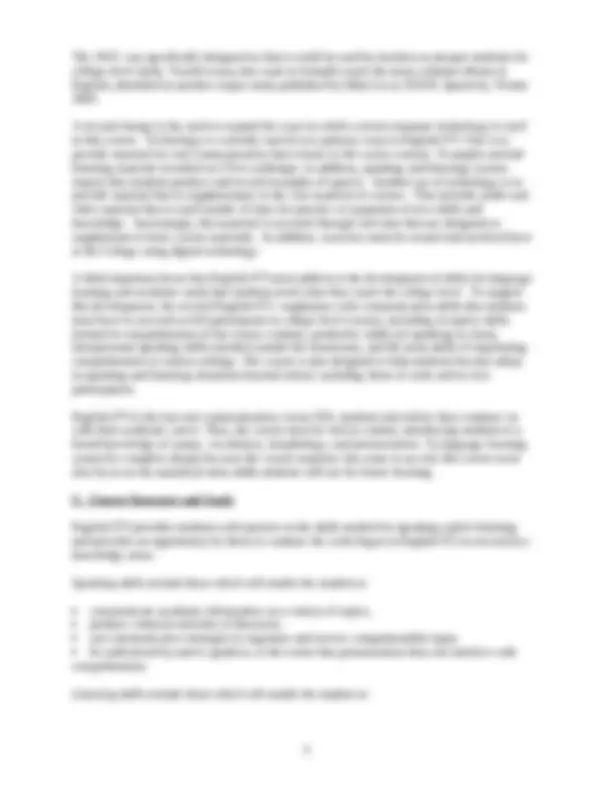
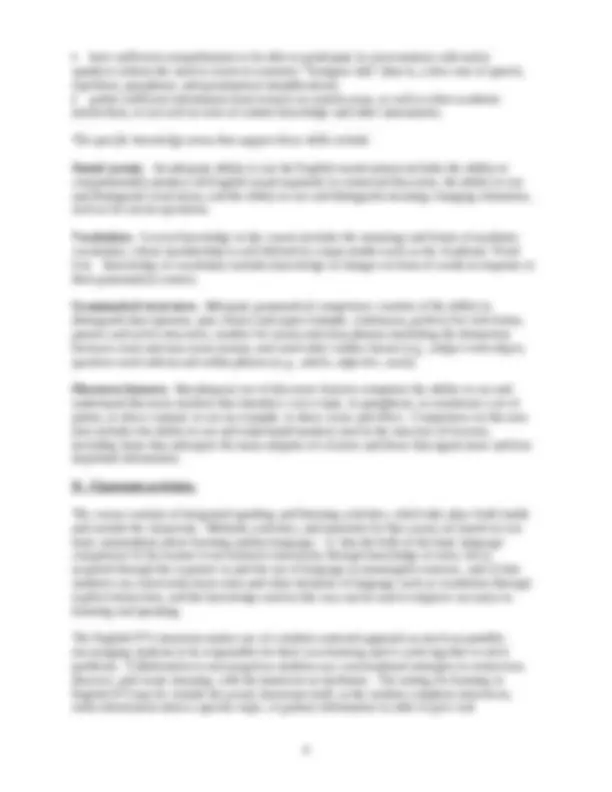
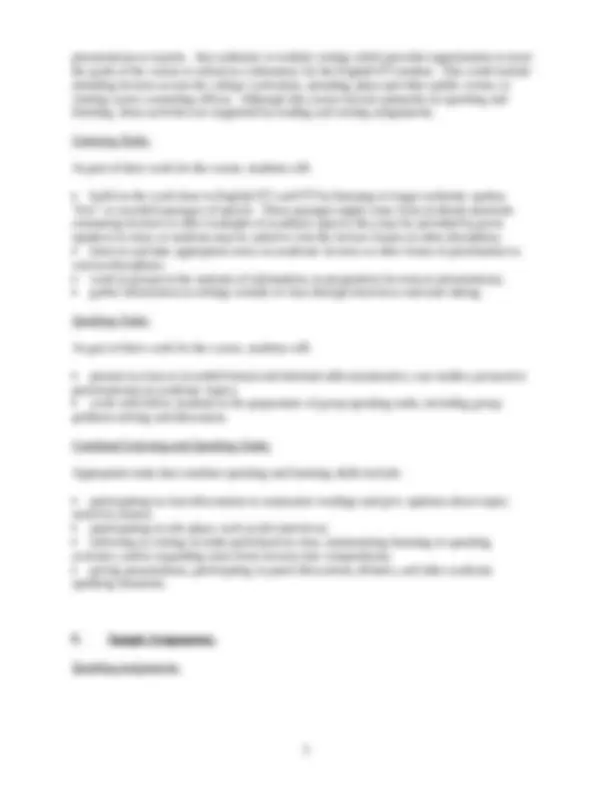
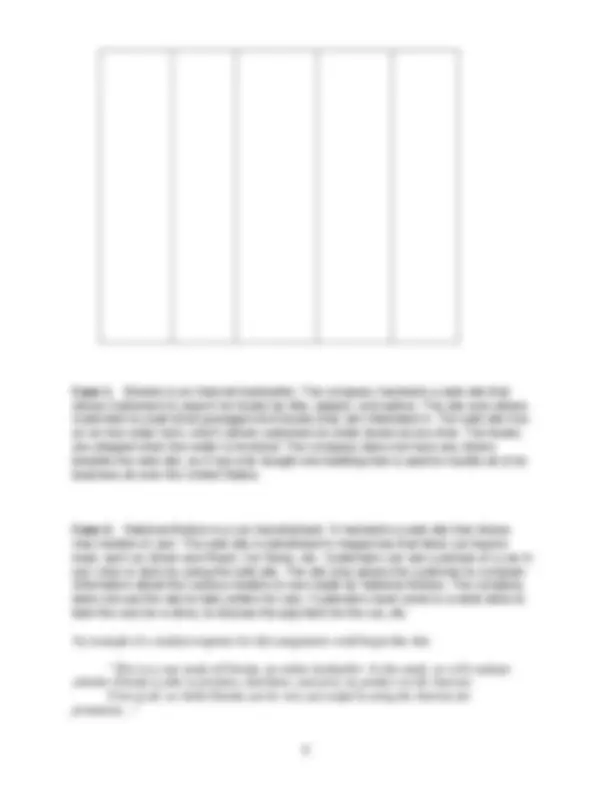
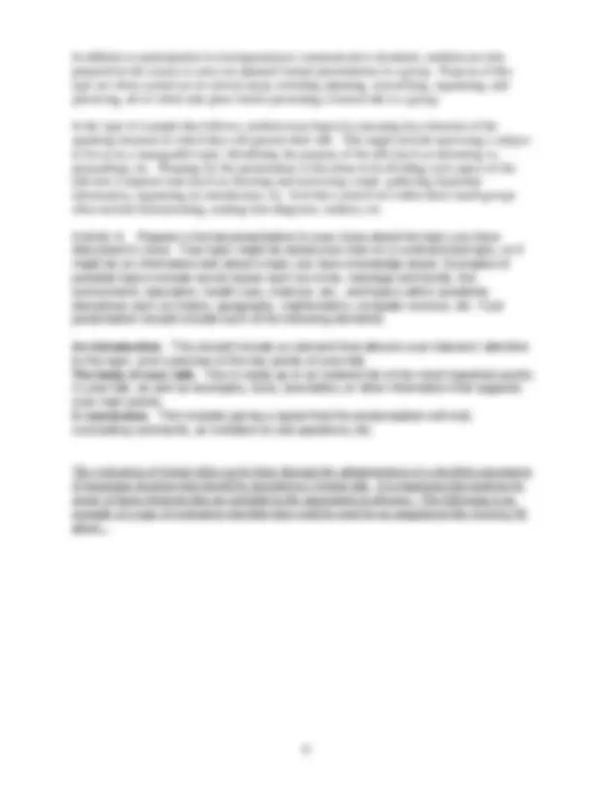
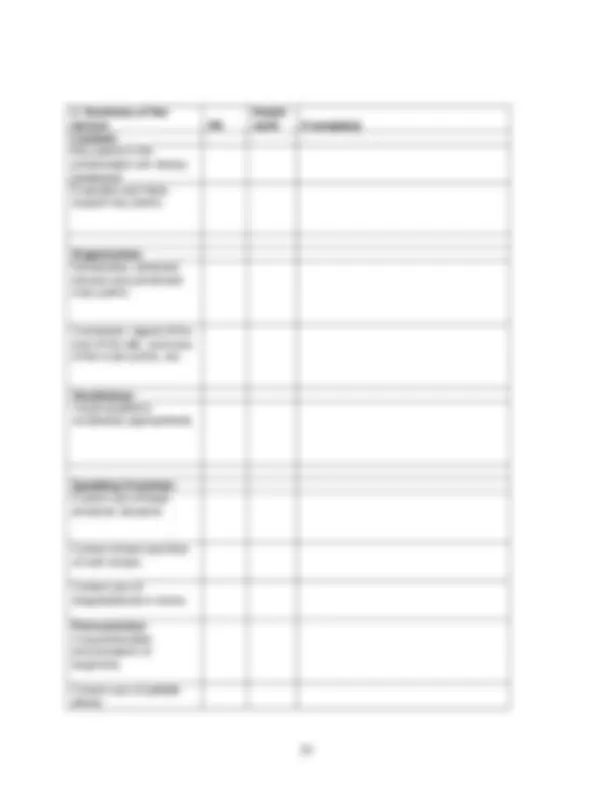
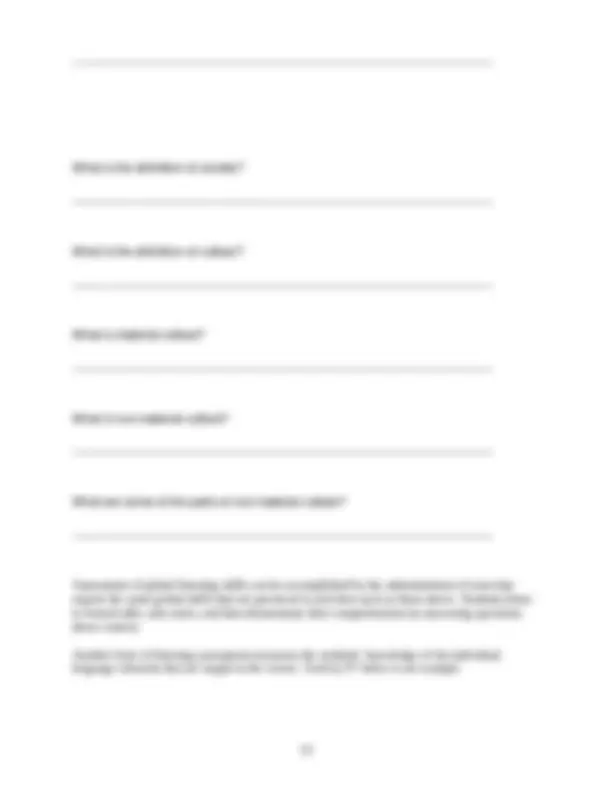
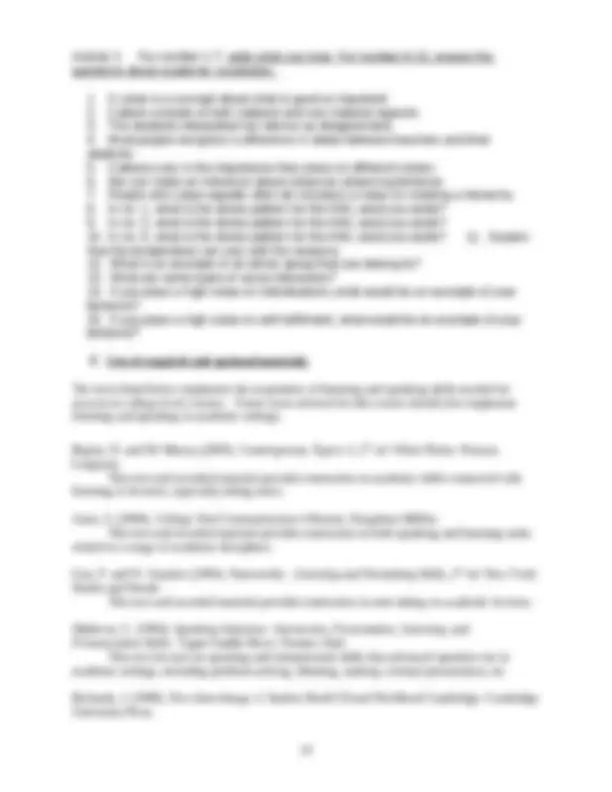
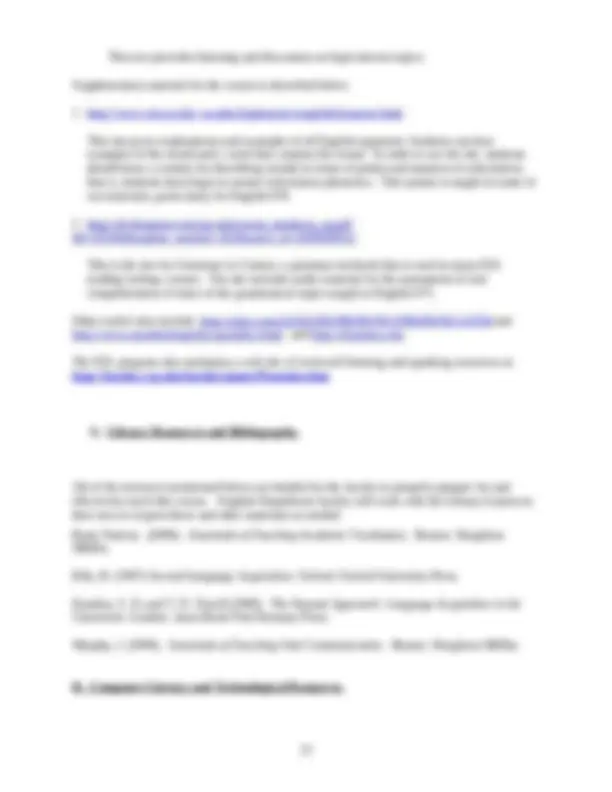
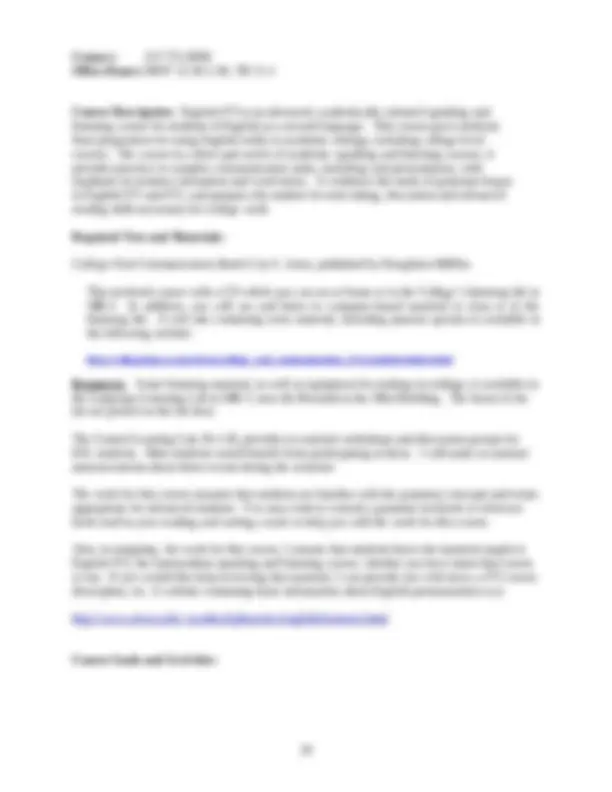
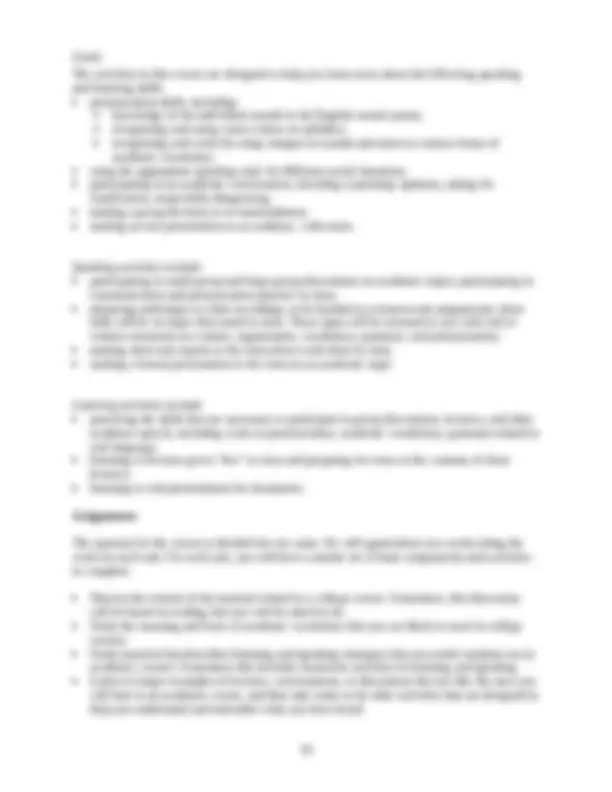
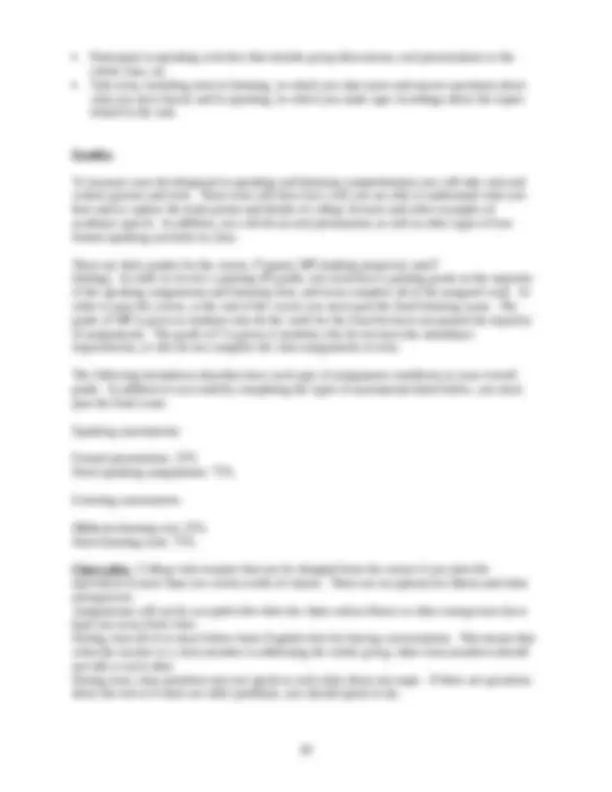
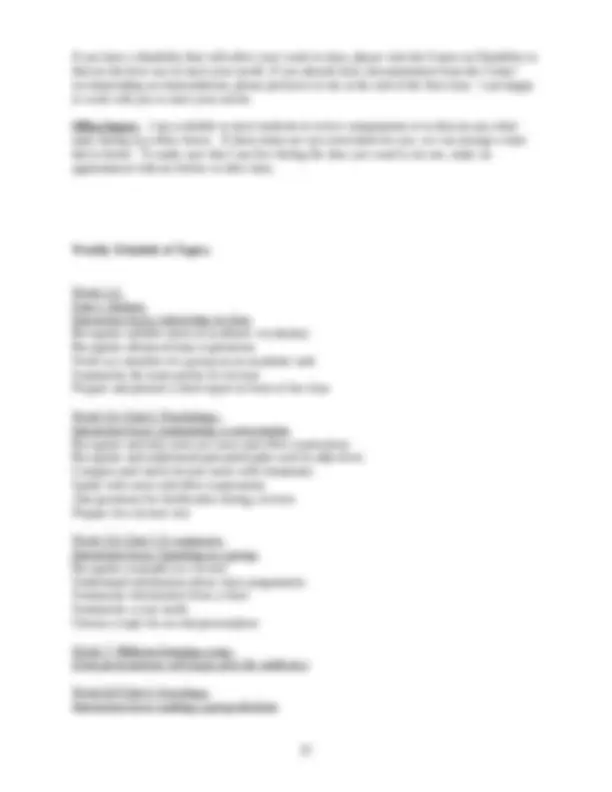
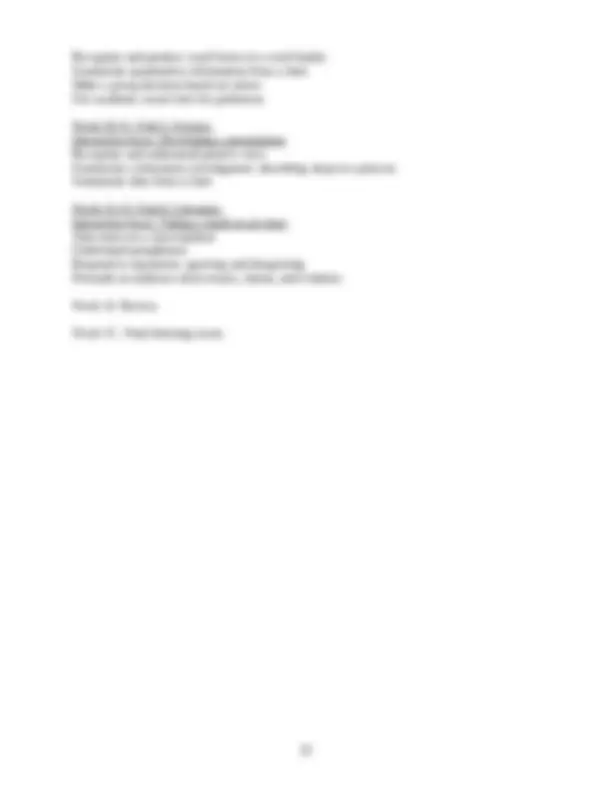


Study with the several resources on Docsity

Earn points by helping other students or get them with a premium plan


Prepare for your exams
Study with the several resources on Docsity

Earn points to download
Earn points by helping other students or get them with a premium plan
Community
Ask the community for help and clear up your study doubts
Discover the best universities in your country according to Docsity users
Free resources
Download our free guides on studying techniques, anxiety management strategies, and thesis advice from Docsity tutors
Material Type: Exam; Class: Inter List + Spkg; Subject: English; University: Community College of Philadelphia; Term: Fall 2006;
Typology: Exams
1 / 22

This page cannot be seen from the preview
Don't miss anything!















Course Title: Advanced Listening and Speaking for Non- native Speakers of English English 073 Course Description: Last course in a three-part series of academic speaking and listening courses, it provides practice in complex communication tasks, including oral presentations, with emphasis on sentence intonation and word stress. It continues the study of grammar begun in English 071 and 072, and prepares the student for note-taking, discussion and advanced reading skills necessary for college work. Prerequisite: Engl 072 or placement; Engl 082/092 or Engl 083/093 placement Schedule: 3-0- Course Writers: Steve Jones, Lyn Buchheit, Linda Fellag, Girija Nagaswami, Suzanne Vernon Course Facilitator: Barbara Spadaro Date: November 17, 2006
A. Course Description English 073 is an academically oriented speaking and listening course for students of English as a second language. This course gives students final preparation for using English orally in academic settings, including college-level courses. The last course in a three-part series of academic speaking and listening courses, it provides practice in complex communication tasks, including oral presentations, with emphasis on sentence intonation and word stress. It continues the study of grammar begun in English 071 and 072, and prepares the student for note-taking, discussion and advanced reading skills necessary for college work. The course is designed for students who have placement scores indicating they are slightly below the level needed for success in college level courses, or who have passed the previous course in the sequence, English 072. B. Rationale . English 073 requires revision in light of a refocusing of the priorities of the ESL program in a more clearly academic direction. Although preparing students to use the English language in academic settings has always been an important goal of this course, introducing students to the specific oral communication skills necessary in college classes has begun to take precedence over the teaching of advanced skills in everyday oral communication. The purpose of this revision is to place English 073 on a par with the ESL reading and writing courses in terms of academic rigor. This refocusing stems from three changes in the teaching of oral communication. One of these changes is the growing emphasis on the role of vocabulary. Current research indicates that certain words have high impact in an academic setting. These words and phrases have been identified in corpus studies such as the Academic Word List (AWL). The Academic Word List was developed at the School of Linguistics and Applied Language Studies at Victoria University of Wellington , New Zealand. The list contains 570 word families which were selected according to principles outlined below. The list does not include words that are in the most frequent 2000 words of English. The AWL was primarily made so that it could be used by teachers as part of a program preparing learners for tertiary level study or used by students working alone to learn the words most needed to study at tertiary institutions. The Academic Word List replaces the University Word List.” (Retrieved 3/1/2006 from http://www.nottingham.ac.uk/~alzsh3/acvocab/)
have sufficient comprehension to be able to participate in conversations with native speakers without the need to resort to extensive “foreigner talk” (that is, a slow rate of speech, repetition, paraphrase, and grammatical simplification); gather sufficient information from lectures in content areas, as well as other academic interactions, to succeed on tests of content knowledge and other assessments. The specific knowledge areas that support these skills include: Sound system. An adequate ability to use the English sound system includes the ability to comprehensibly produce all-English sound segments in connected discourse, the ability to use and distinguish word stress, and the ability to use and distinguish meaning-changing intonation, such as for yes/no questions. Vocabulary. Lexical knowledge in the course includes the meanings and forms of academic vocabulary, whose membership is well defined in corpus studies such as the Academic Word List. Knowledge of vocabulary includes knowledge of changes in form of words in response to their grammatical context. Grammatical structures. A dequate grammatical competence consists of the ability to distinguish time (present, past, future) and aspect (simple, continuous, perfect) for verb forms, passive and active structures, number for nouns and noun phrases (including the distinction between count and non-count nouns), and word order within clauses (e.g., subject-verb-object, question word orders) and within phrases (e.g., article, adjective, noun). Discourse features. An adequate use of discourse features comprises the ability to use and understand discourse markers that introduce a new topic; to paraphrase; to enumerate a set of points; to show contrast; to use an example; to show cause and effect. Competence in this area also includes the ability to use and understand markers used in the structure of lectures, including those that anticipate the main subparts of a lecture and those that signal more and less important information. D. Classroom activities. The course consists of integrated speaking and listening activities, which take place both inside and outside the classroom. Methods, activities, and materials for this course are based on two basic assumptions about learning spoken language: 1) that the bulk of the basic language competence of the learner is not learned consciously through knowledge of rules, but is acquired through the exposure to and the use of language in meaningful contexts., and 2) that students can consciously learn rules and other elements of language such as vocabulary through explicit instruction, and the knowledge used in this way can be used to improve accuracy in listening and speaking. The English 073 classroom makes use of a student-centered approach as much as possible, encouraging students to be responsible for their own learning and to work together to solve problems. Collaboration is encouraged as students use conversational strategies to restructure, discover, and create meaning, with the instructor as facilitator. The setting for learning in English 073 may be outside the actual classroom itself, as the student completes interviews, seeks information about a specific topic, or gathers information in order to give oral
presentations or reports. Any authentic or realistic setting which provides opportunities to meet the goals of the course is valued as a laboratory for the English 073 student. This could include attending lectures across the college curriculum, attending plays and other public events, or visiting career counseling offices. Although this course focuses primarily on speaking and listening, these activities are supported by reading and writing assignments. Listening Tasks: As part of their work for the course, students will: build on the work done in English 071 and 072 by listening to longer authentic spoken “live” or recorded passages of speech. These passages might come from textbook materials containing lectures or other examples of academic speech; they may be provided by guest speakers in class; or students may be asked to visit the lecture classes in other disciplines; listen to and take appropriate notes on academic lectures or other forms of presentation in various disciplines; work in groups in the analysis of information, in preparation for tests or presentations; gather information in settings outside of class through interviews and note-taking. Speaking Tasks: As part of their work for the course, students will: present in-class or recorded formal and informal talks (summaries, case studies, persuasive presentations) on academic topics; work with fellow students in the preparation of group speaking tasks, including group problem-solving and discussion. Combined Listening and Speaking Tasks: Appropriate tasks that combine speaking and listening skills include: participating in class discussions to summarize readings and give opinions about topics raised in classes; participating in role-plays, such as job interviews; reflecting in writing on tasks performed in class, summarizing listening or speaking activities, and/or expanding notes from lectures into compositions; giving presentations, participating in panel discussions, debates, and other academic speaking situations. E. Sample Assignments Speaking assignments.
airline plane tickets
magazine publisher news magazine
An example of a student response in this activity could be: “I think car companies could use the Internet to promote their product. For example, a web site could show photos and videos of cars and features. But they could not really use the Internet to lower their prices. We read in the book that car companies can’t lower their prices because of competition.” Assessment of students’ ability in the skill areas connected to this type of activity can be done in various ways. It is possible for teachers to make informal assessments of students as they carry out their work in these assignments, either within their small groups or as they report on their discussions more formally. This informal assessment can help in making decisions about which points need more work in the course, and also in making broad assessments of individual students. Other, more formal forms of assessment can be done by means of “culminating” assignments that are planned in advance, and in which students follow a formal organizational structure that includes an introduction, the presentation of main points and examples, and so on. The activity below is an example of an assignment that can be used as a formal assessment. Activity II .-- Case study. In this assignment, you will discuss a simple e-business case study. First, read the information in the two cases, and choose one of the cases. Then, prepare a short talk about how you think the business in that case will perform. Discuss the case in terms of how well the business can distribute, promote, and price its product. Make notes for your talk. In your notes, you can record information that relates to marketing elements, answering questions such as, “Do you think the business will be able to use the Internet to distribute the product? If so, how? Will the business be able to promote the product?” You can organize the notes for your talk like this: Company Product Distribute? Promote? Price?
Case 1. Ebooks is an Internet bookseller. The company maintains a web site that allows customers to search for books by title, subject, and author. The site also allows customers to read short passages from books they are interested in. The web site has an on-line order form, which allows customers to order books at any time. The books are shipped when the order is received. The company does not have any stores besides the web site, so it has only bought one building that is used to handle all of its business all over the United States. Case 2. National Motors is a car manufacturer. It maintains a web site that shows new models of cars. The web site is advertised in magazines that likely car buyers read, such as Street and Road , Car News , etc. Customers can see a picture of a car in any color or style by using the web site. The site also allows the customer to compare information about the various models of cars made by National Motors. The company does not use the site to take orders for cars. Customers must come to a retail store to take the cars for a drive, to discuss the payment for the car, etc. An example of a student response for this assignment could begin like this: “This is a case study of Ebooks, an online bookseller. In this study, we will evaluate whether Ebooks is able to promote, distribute, and price its product on the Internet. First of all, we think Ebooks can be very successful in using the Internet for promotion…”
1. Summary of the lecture OK Needs work Example(s) Content: Key points in the presentation are clearly presented Examples and facts support key points Organization: Introduction: attracted interest and previewed main points Conclusion: signal of the end of the talk, summary of the main points, etc. Vocabulary: -Used academic vocabulary appropriately Speaking Grammar: Correct use of basic sentence structure Correct choice and form of verb tenses Correct use of singular/plural in nouns Pronunciation Comprehensible pronunciation of segments Correct use of syllable stress
What is the definition of society?
What is the definition of culture?
What is material culture?
What is non-material culture?
What are some of the parts of non-material culture?
Assessment of global listening skills can be accomplished by the administration of tests that require the same global skills that are practiced in activities such as those above. Students listen to formal talks, take notes, and then demonstrate their comprehension by answering questions about content. Another form of listening assessment measures the students’ knowledge of the individual language elements that are taught in the course. Activity IV below is an example.
Activity V. For number 1-7, write what you hear. For number 8-15, answer the questions about academic vocabulary.
The courses in the ESL speaking and listening sequence make use of computer technology to enhance language learning. However, it is important to note that technology serves to supplement and/or support the overarching language teaching goals of this course, which are based on face to face interaction. At present, ESL teachers encourage students who need intensive practice to use the Language Listening Lab to utilize web-based, CD/ROM, and audio-taped material (exercises in speaking and listening texts, teacher-made listening material, and recording of student speaking assignments). Teachers also make use of video cameras, video players, audio players, and other forms of technology to supplement or enhance class activities and/or provide feedback to students. Other resources used include materials available from the College’s Audio Visual department, including materials related to public speaking (for example, materials showing job interviews) and commercially prepared materials (such as video recordings on conflict resolution. Ideally, students should have access to software for playing and recording examples of speech; in addition, they should have access to the Internet by means of a desktop computer that is equipped with sound capability. Many students have access to these things at home; however, those who are provided access through the Language Listening Lab, where instructors will provide help as needed in finding web sites, selecting links, and playing audio files. The recent addition of eight networked computer stations with sound capability to our Lab currently allows us these upgraded capabilities: access to CD/ROM tutorial programs that serve as supplements to our courses; access to the Internet, including sites for listening to speech; separate spaces for students who are making recordings and for those who are listening to recorded material; a program of software piloting and review by interested faculty members, leading to recommendations for purchase. I. Student Assessment. Assessment of speaking and listening proficiency in 073 depends on a variety of measures, not just in-class tests and exams. It is not a totally quantitative process, so it allows for some interpretation of what is best for each student. However, there are also standardized expectations for passing the course. (See Course Structure and Goals on page 3). Also, it is reasonable for teachers to weigh the performance of students closer to the end of the semester differently from their performance at the beginning of the course. Student assessment begins during the first week of the semester with a diagnostic listening test. New students can be moved to a lower level, or placed out of the course, at this point based on the results of this assessment. A continuing student who has passed 072 cannot be moved to a lower level even if English 073 seems inappropriate. Therefore, the teacher will have to work with that student either to fill in the gaps in background. Final exam performance is one factor among others in deciding a student’s grade. The classroom
instructor makes the final decision about whether each student is ready to pass the course by using a semester-long evaluation of that student’s performance, with an eye both to consistent improvement and the student’s level at the end of the semester. Students’ speaking skill and listening comprehension will be measured by their performance on oral or written discrete point listening tests and on their ability to capture the main points and details of college lectures on written and oral tests. In addition, their ability to speak comprehensibly with grammatically accurate English, adequate pronunciation, and adequate control of academic vocabulary will be demonstrated by graded in-class presentations (longer than in English 072) on topics related to lectures, readings or peer discussion. Student must also be able to answer extemporaneously questions from class members about such presentations. Students’ ability to use basic social language rules, such as for greetings, partings, beginning and ending conversations, giving advice, agreeing and disagreeing, giving directives, and participating in academic “service” encounters will be measured through graded and ungraded classroom activities such as role-playing and discussion. Their comprehension in conversations with classmates, teachers, and other native speakers on both academic and everyday topics will be assessed (through paraphrasing, clarification, etc.) by one-on-one interviews or examinations with the instructors, as well as by teacher observation over the course of the semester. There are three grades for the course, P (pass), MP (making progress), and F (failing). In order to receive a passing (P) grade, a student must have a passing grade on most of the recorded talks and listening tests and must complete all of the assigned work. In order to pass the course, at the end of the course you must pass the final listening exam. The grade of MP is given to students who do the work for the class but have not passed the majority of assignments. The grade of F is given to students who do not meet the attendance requirements, or who do not complete the class assignments or tests. J. Course Assessment. ESL faculty members engage each semester in curriculum discussion and refer to the course documents to assess the course. Syllabi and assignments are constructed and assessed using information contained in the current course documents. Course reviews are carried out by committees that meet every several years to determine whether revision is necessary. Faculty also complete annual course evaluations using the English Department’s course evaluation form. (See Appendix.) K. Sample syllabus.
Instructor: Office: Room BR-23J
Goals: The activities in this course are designed to help you learn more about the following speaking and listening skills: pronunciation skills, including: knowledge of the individual sounds in the English sound system, recognizing and using correct stress on syllables; recognizing and correctly using changes in sounds and stress in various forms of academic vocabulary using the appropriate speaking style for different social situations; participating in an academic conversation, including expressing opinions, asking for clarification, respectfully disagreeing; making a group decision or recommendation; making an oral presentation to an audience, with notes. Speaking activities include: participating in small group and large group discussions on academic topics; participating in communication and pronunciation practice in class; preparing audiotapes or other recordings, to be handed in as homework assignments; these talks will be on topics discussed in class. These tapes will be returned to you with oral or written comments on content, organization, vocabulary, grammar, and pronunciation; making short oral reports to the class about work done in class; making a formal presentation to the class on an academic topic. Listening activities include : practicing the skills that are necessary to participate in group discussions, lectures, and other academic speech, including work on pronunciation, academic vocabulary, grammar related to oral language; listening to lectures given "live" in class and preparing for tests on the contents of these lectures; listening to oral presentations by classmates; Assignments The material for the course is divided into six units. We will spend about two weeks doing the work for each unit. For each unit, you will have a similar set of basic assignments and activities to complete: Discuss the content of the material related to a college course. Sometimes, this discussion will be based on reading that you will be asked to do. Study the meaning and form of academic vocabulary that you are likely to meet in college courses. Study material that describes listening and speaking strategies that successful students use in academic courses. Sometimes this includes classroom activities in listening and speaking. Listen to longer examples of lectures, conversations, or discussions that are like the ones you will hear in an academic course, and then take notes or do other activities that are designed to help you understand and remember what you have heard.
Participate in speaking activities that include group discussions, oral presentations to the whole class, etc. Take tests, including tests in listening, in which you take notes and answer questions about what you have heard, and in speaking, in which you make tape recordings about the topics related to the unit. Grades: To measure your development in speaking and listening comprehension you will take oral and written quizzes and tests. These tests will show how well you are able to understand what you hear and to capture the main points and details of college lectures and other examples of academic speech. In addition, you will do an oral presentation as well as other types of less formal speaking activities in class. There are three grades for the course, P (pass), MP (making progress), and F (failing). In order to receive a passing (P) grade, you must have a passing grade on the majority of the speaking assignments and listening tests, and must complete all of the assigned work. In order to pass the course, at the end of the course you must pass the final listening exam. The grade of MP is given to students who do the work for the class but have not passed the majority of assignments. The grade of F is given to students who do not meet the attendance requirements, or who do not complete the class assignments or tests. The following breakdown describes how each type of assignment contributes to your overall grade. In addition to successfully completing the types of assessments listed below, you must pass the final exam: Speaking assessments: Formal presentation: 25% Short speaking assignments: 75% Listening assessments: Midterm listening test: 25% Short listening tests: 75% Class rules: College rules require that you be dropped from the course if you miss the equivalent of more than two weeks worth of classes. There are exceptions for illness and other emergencies. Assignments will not be accepted after their due dates unless illness or other emergencies have kept you away from class. During class all of us must follow basic English rules for having conversations. This means that when the teacher or a class member is addressing the whole group, other class members should not talk to each other. During tests, class members may not speak to each other about any topic. If there are questions about the test or if there are other problems, you should speak to me.